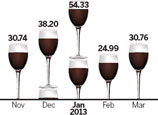
China's 289 cities and municipalities have a low level of fiscal transparency, with three cities having no transparency at all, China Economic Weekly reported Tuesday, citing a survey.
The survey, conducted by the School of Public Policy and Management at Tsinghua University in 2013, covered all of China's 285 prefecture-level cities (except Sansha city) and four municipalities. It included four parts, with each part worth 100 points: departments included in the budget; normal budget and expenditures; extra-budgetary and government debts; government capital and State-owned companies' revenue and expenditures.
Eighty-four percent of cities, or 243, scored below 100. Among all the cities, Shanghai was the most transparent, with Beijing following, and three cities at the bottom scored zero.
The three bottom-ranking cities - Baicheng in Jilin province, Tongren in Guizhou province and Dingxi in Gansu province - did not disclose any information in terms of the four indexes.
Among provinces, Guangdong performed best, with 10 cities in the top 30, and Anhui province followed with five. East China, which usually leads in the economy, lags behind.
"This shows public management is not directly connected with economic development but may be more related with social environment and political resolution," said Yu Qiao, team leader of the survey.
Wang Wenchao, an official at the Finance Bureau of Hangzhou city, which ranked 9th, said financial disclosure is a step-by-step process. On deciding what information can be disclosed and to what degree, cities usually compare themselves with neighboring cities, for example, Hangzhou compares itself to Nanjing and Ningbo.
"We are not allowed to lag behind or lead too much compared with them," said Wang. Also, it's directed and restricted by the provincial government. If the provincial government does not disclose, it's impossible for a city to do so.
















 China builds 'world's tallest building'
China builds 'world's tallest building'


![]()
